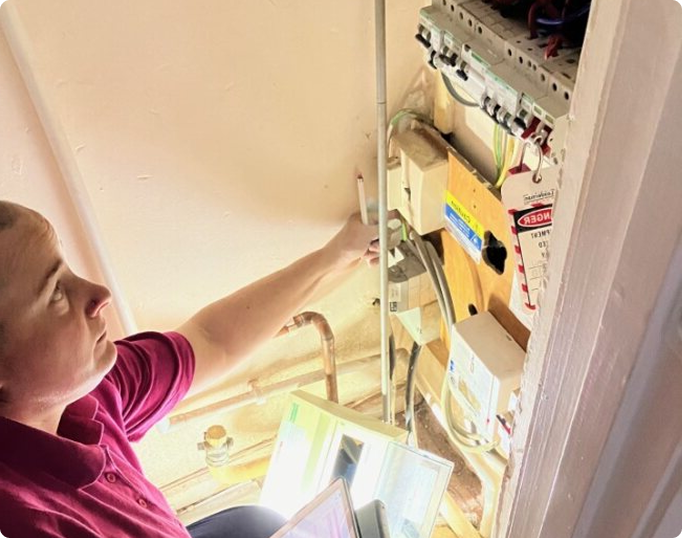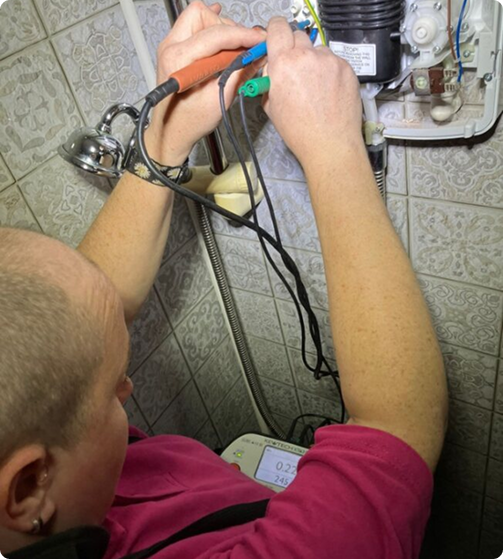

What is an EICR Check?
An EICR check refers to an Electrical Installation Condition Report. It’s an official document provided after a qualified electrician or electrical engineer inspects and tests the electrical systems in a property. The purpose is to ensure the safety and compliance of the installation with UK electrical standards.

Who Needs an EICR?


Landlords
- Legally required every 5 years or at the start of a new tenancy
- Ensures tenant safety & compliance with 2020 PRS Electrical Safety Regulations.
- Identifies risks such as outdated wiring, overloaded circuits, or faulty connections


Commercial & Business Owners
- Ensures compliance with Health & Safety Regulations
- Protects employees, customers, and your business from electrical hazards
- Avoids potential legal issues or insurance claims


Homebuyers & Sellers
- Recommended before buying a home to check for electrical safety issues
- Helps avoid unexpected costs for repairs or rewiring
- Provides peace of mind before making one of the biggest investments of your life

- Condition of wiring, sockets, switches & fuse boards
- Overloaded circuits or faulty connections
- Signs of wear & tear or electrical hazards
- Compliance with BS 7671 (Wiring Regulations)
- Risk of electric shock or fire
Why our Clients Trust Little Miss Sparky
NAPIT-Registered Experts
All work meets UK wiring standards.
All-Female Person in Team
A welcoming, no-pressure environment.
Vulnerable Client Specialists
Extra patience for elderly or anxious customers.
5-Star Rated
Brilliant service from start to finish! (Google Reviews)

Let’s Talk Electrics
Whether you need urgent repairs or planning a lighting project, we’re just a call/click away.
What’s Involved in an EICR?
1. Visual Inspection
The electrician begins with a thorough visual check of your electrical system. This includes identifying:
- Damaged or outdated sockets and switches
- Exposed or deteriorated wiring
- Signs of overheating or burning
- Non-compliant or old fuse boxes
2. Testing (Dead & Live)
To ensure safety and performance, the electrician performs several technical tests:
Dead Testing (Power Off)
- Continuity Testing: Confirms proper connection of wires
- Insulation Resistance: Detects potential risks of short circuits
- Polarity Checks: Ensures live, neutral, and earth wires are correctly placed
- Earth Continuity: Confirms all circuits are properly earthed
Live Testing (Power On)
- Earth Fault Loop Impedance: Checks the system's response to electrical faults
- RCD Testing: Verifies that safety devices trip correctly
- Functional Testing: Ensures all protective devices work as intended
3. The EICR Report
After the inspection and tests, you’ll receive a detailed report that includes:
- The overall condition of your installation
- A list of issues found, if any
- A grading system to highlight the severity of each issue:
- C2 – Potentially dangerous, urgent attention required
- C3 – Improvement recommended
You’ll also receive an overall rating of Satisfactory or Unsatisfactory.
4. Remedial Work (If Required)
If the report is unsatisfactory, remedial work may be needed. This can include:
- Replacing damaged components
- Upgrading the fuse board
- Improving earthing or bonding
- Rewiring unsafe circuits
Who Needs an EICR?
- Landlords: Legally required every 5 years for rental properties
- Homeowners: Recommended every 10 years (or every 5 years for older homes)
- Businesses and Commercial Properties: Often required for insurance or regulatory compliance
Need to book an EICR or want to check if your property is due? Contact us today or request a quote online.
- 07979 500360
- info@littlemisssparky.com
- 4 Station Ct, Cannock WS11 0EJ, United Kingdom
